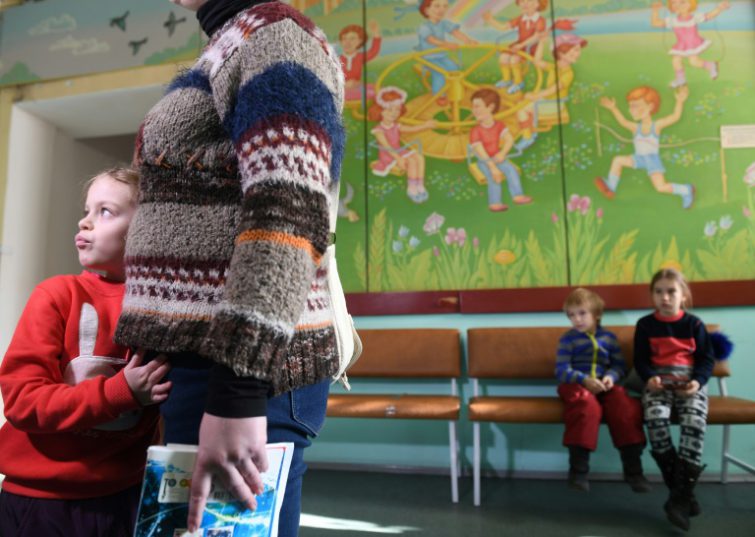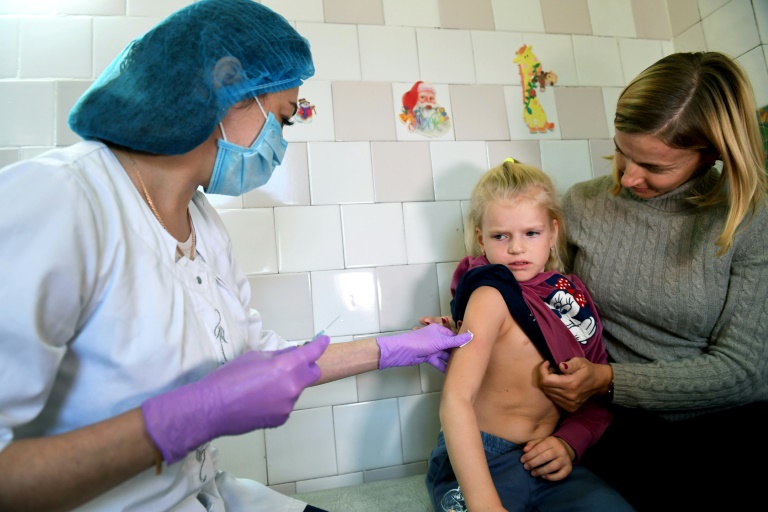England overcome poor conditions to grab 2-1 series win over Proteas
Parents, including those who for years refused vaccinations for their children, are queueing at clinics after schools extended their holidays or refused to let unvaccinated students attend lessons.
In a public children’s hospital in central Kiev, the door slammed constantly as concerned parents rushed in.
“We vaccinated 150 children (in a single day)… This is three to four times more than we usually do,” said Oksana Gutova, head of the hospital where staff now have to work overtime and weekends.
A paediatrician from a private medical centre in Kiev said all but three of his 15 patients on a recent Saturday had come for immunisation.
“We have exhausted our stock of measles, mumps and rubella vaccines for three months in two days,” he told AFP.
In 2017, almost 4,800 cases of measles and five fatalities were recorded in the former Soviet republic.
Since the start of this year, close to 2,100 Ukrainians have already been infected and three of them died, including two children.
In principle, vaccinations against certain infections are mandatory in Ukraine but there is no punishment for non-compliance.
– False certificates –

Just 42 percent of one-year-olds had been vaccinated against measles in Ukraine by the end of 2016, according to UNICEF
Ukrainian authorities and international organisations blame the outbreak on a lengthy hiatus in immunisations, caused by public resistance to vaccines fanned by news reports and rumours.
Changes to the system of buying medicines from abroad also led to interrupted supplies in 2015-16.
Just 42 percent of one-year-olds had been vaccinated against measles in Ukraine by the end of 2016 — making it the world’s third-worst performing country after South Sudan and Equatorial Guinea, according to the UN’s children’s agency UNICEF.
Although the rate shot up to 93 percent the following year, based on latest figures from Kiev, this has not made up for the shortfall of the previous years.
“We are making progress -– but we are not there yet,” Giovanna Barberis, UNICEF representative in Ukraine, said in a written comment to AFP.
The World Health Organization (WHO) recommends a 98-percent vaccination rate to prevent mass hospitalisations and fatalities, Barberis said.
The official vaccination rate from Kiev should also be interpreted with caution, she added, as there is a widespread practice in Ukraine of buying fake medical certificates to confirm a non-existent vaccination.
According to a study conducted in 2016, 52 percent of health workers have reported that they had been asked for fake vaccination certificates, the UNICEF official said.
– Diphtheria could be next –

The World Health Organization (WHO) recommends a 98-percent vaccination rate to prevent mass hospitalisations and fatalities from measles
The country has already experienced several measles outbreaks, with the worst one affecting more than 40,000 people in 2006.
In response, the authorities launched an immunisation campaign, but it ran into trouble after the death of a teenager in 2008 who had received an India-made vaccine not certified in Ukraine.
The case fuelled public distrust despite an official probe concluding the death was not caused by the vaccine.
Faced with the current outbreak, authorities in the southern Odessa region — where all the most recent fatalities have been recorded — decided to extend school holidays for at least two weeks in some districts.
The Kiev City Council for its part recommended schools and kindergartens ban unvaccinated children from attending lessons.
The announcement drove many parents to immunise their children immediately.
Among them was Oleksandra Filatova, a mother of five who came to a clinic with her two youngest daughters, aged five and ten.
“I’ve heard all kinds of terrible stories about children who were paralysed, who stopped talking,” she told AFP, explaining why she had never had her children vaccinated for fear of complications.
But the risk of seeing her children catching measles or missing out on school made Filatova change her mind.
She said they would also get jabs for tetanus, diphtheria and whooping cough.
Only 19 percent of Ukrainian children had been vaccinated against these three diseases in 2016, according to UNICEF.
The following year that figure was still less than 50 percent.
Popular Ukrainian paediatrician Yevgen Komarovsky issued a grim warning via YouTube on the basis of these statistics.
“Measles are here, now we are waiting for diphtheria”, he said.
Download our app and read this and other great stories on the move. Available for Android and iOS.